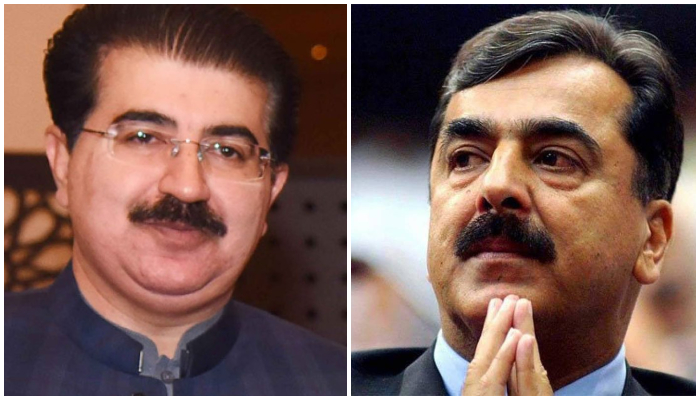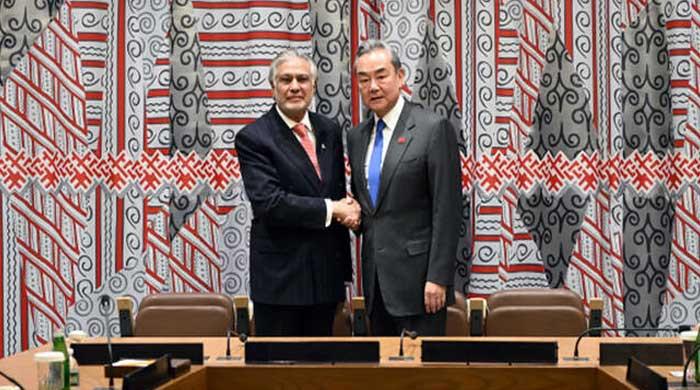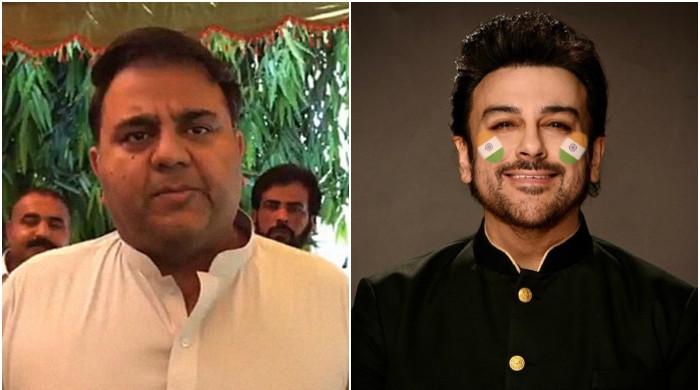With the numbers precariously balanced, Senate chairman election up in the air
As govt, opposition parties lobby for their candidates for Senate chairmanship, the numbers hint that the election is too close to call
March 09, 2021

The Upper House of Pakistan's parliament, the Senate, which plays a crucial role in examining public bills, will elect a new chairman on March 12 — a day after the outgoing lot retires and on the day newly-elected members are sworn in.
The race is promising to be a hotly contested one between the government alliance's nominee, Sadiq Sanjrani — the incumbent vying for a second term — and Yousaf Raza Gillani — the former prime minister who has been pitched by the Pakistan Democratic Movement, a multi-party opposition alliance.
All eyes are on the election, especially after the Opposition, in a shock move, managed to secure enough votes in last week’s Senate polls to elect Gilani to a general seat from the lower house, which is dominated by the government alliance.
As of now, the opposition holds a razor thin majority in the upper house. Will that be enough to score a win?
How is the Senate chairman elected?
According to Article 60 of the Constitution, the chairman and deputy chairman of the Senate are elected from amongst its members for a three-year term.
The election is held through a secret ballot and the candidate who secures the most number of votes is elected, according to the Rules of Procedure and Conduct of Business in the Senate, 2021.
If two candidates get an equal number of votes, the rules say a fresh ballot has to be held until one secures more votes than the other.
This last scenario, although it may seem unlikely, seems a tantalising possibility this time around due to how the Senate is split. More on this later.
Will Sanjrani become Senate chairman again?
If Sanjrani can corral enough votes, he will be elected head of the House for a second consecutive term.
However, the opposition holds a slim majority in the Senate. Does that mean Gillani has a better shot?
Let's do the math.
There will be a total of 100 senators in the Upper House on March 12 after the swearing-in ceremony.
This year, the government and its allies — which include the MQM-Pakistan, the Balochistan Awami Party (BAP) and the PML-Q — won a combined 27 seats in the Senate. The coalition also has the support of 19 senators who will be staying on till 2024.
That brings the total number of senators behind the PTI and its allies to 46.
Now, over to the opposition.
Last week, the PML-N, PPP, JUI-F and BNP-M won a combined 17 seats. They also have the support of 32 senators continuing in the house till 2024.
This brings their total to 49.
However, from that total of 49, the PML-N's Ishaq Dar, who was elected senator in 2018, has yet to take oath and is unlikely to be able to vote for the Senate chairman.
That means the opposition in reality has only 48 senators, and the Senate itself will have 99 members able to vote.
Bear in mind that the the government and opposition's numbers combined (46+48 = 94) still leave 5 senators to be accounted for.
These are the senators who will be key to determining the final result. More on them below.
Who holds the cards?
There are a few deciding factors which can tilt the balance of the March 12 Senate chairman election in either the opposition or the government’s favour.
One, the Jamaat-e-Islami (JI).
The JI has one senator in the Upper House. While the JI sits on the opposition benches, it has yet to openly side with either the ruling party or the opposition alliance. It can, for now, considered to be neutral.
If the JI abstains from voting, the maximum number of votes that can be polled on March 12 falls to 98, with 46 of those with the government alliance and 48 with the opposition, and 4 votes up for grabs.
Two, the independents.
Last week, two independent candidates were elected as senators from Balochistan. Their allegiance is, as yet, unclear. One of them, Abdul Qadir, was earlier given a PTI ticket, but won the Senate election with the support of BAP, an ally of the PTI. He is likely to vote for Sanjrani. The other independent had joined the BNP-M just a day before the election.
Splitting the two between the government and the alliance gives us 47 votes for the government and 49 for the opposition (with JI abstaining).
Three, the Awami National Party.
While the ANP is otherwise a part of the opposition alliance, it got one senator elected this year from the Balochistan assembly with the support of BAP.
At the moment, the ANP has two senators in the house.
If the ANP decides to return the favour, its two senators would give the government 49 votes, with the opposition also commanding 49 votes.
In that scenario, if the JI decides to back the government-nominated candidate, it would give Sanjrani 50 votes and a simple majority. If it abstains, there would be another round of voting (and another) till one or more of the voters relent and vote for the opposing candidate.
However, if the votes of JI and ANP go to Gillani, he will win with 52 votes.
But as they say (and this is particularly true for Pakistani elections), there's many a slip between the cup and the lip: the voting is going to be through secret ballot, which has already given us a shock result in the March 3 election. Could we be in for another upset? It's really anyone's guess.












